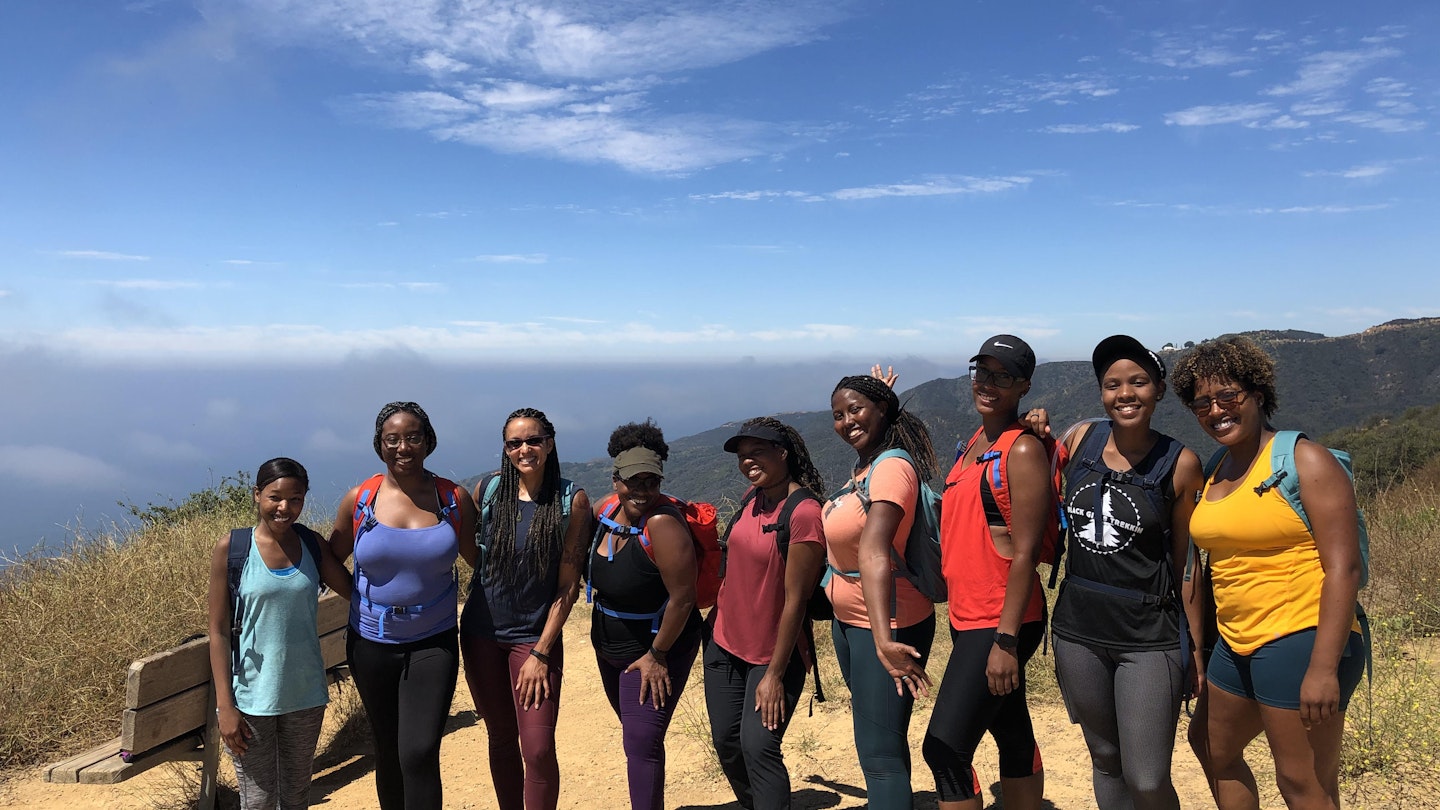Empowering Black Americans to Reconnect with Nature
For Black Americans, reconnecting with the outdoors opens up opportunities for mindfulness, introspection, and peace of mind because, in nature, skin color is not a gatekeeper or political statement; it’s simply a matter of how fast you sunburn.
Though Black people have been avid outdoor enthusiasts historically and culturally—Black cowboys once made up 25% of cattle industry workers in the 19th century—there is no denying the trauma of lynchings that are forever linked to outdoor spaces. However, many are now reclaiming the narrative and creating spaces for inclusivity. Below is a list of Black hiking groups in the U.S. committed to reopening the American outdoors for underrepresented communities.
Black Girls Trekkin’
Tiffany Tharpe and Michelle Race founded the LA-based group Black Girls Trekkin’ in November 2017 to enhance Black female representation on local hiking trails.
“I thought that if I were young and interested in getting outside, I’d want to see familiar faces in the outdoors,” Tharpe shares. Moreover, they hope that increased representation in hiking will encourage environmental conservation among future generations.
“It’s crucial because those kids growing up will be the ones fighting for the protection of the environment when they’re older but may not feel inclined to if they don’t see themselves in the outdoors,” Tharpe adds.

Hammock Gang
Founded in April 2019 by Black outdoorswoman Samantha Feaster, Hammock Gang explores the natural surroundings of Houston, Texas.
Many Black individuals often feel excluded from mainstream hiking experiences. However, Feaster’s mission has been to create a welcoming space where all can enjoy the outdoors equally.
“Seeing someone who looks like you doing something new empowers you, reminding you that the outdoors is a place for everyone,” she affirms.
HIKEOLUTION
The NJ-based group HIKEOLUTION, established in January 2017 by founder Keyana Jones, aims to “hike for a solution, evolution, and revolution.” What began as a happy accident during a third date has transformed into an inclusive community of nearly 1000 Black hikers and allies.
Jones emphasizes that hiking has always been a natural fit for Black people throughout history. “The great Harriet Tubman, one of my favorite ancestors, was technically a hiker. We rarely hear her story told from that perspective,” she shares.
Black Girls Hike RVA
Black Girls Hike RVA founders Nicole Boyd and Narshara Tucker grew up associating the outdoors with joy and serenity, participating in cookouts, playing sports, hiking, or tending to gardens.
They specifically empower Black women to embrace outdoor activities, enriching families and helping to instill a positive relationship with nature for future generations.
Based in Richmond, Virginia, they organize hikes on state park trails and monthly trips to the nearby Blue Ridge Mountains, about a 2.5-hour drive from Richmond.

Black Girls Hike Buffalo
Black Girls Hike Buffalo was founded in 2018 by LaTesha Bulluck to unite health-focused women of color within the wider Buffalo, NY metro area.
“Hiking has many benefits, including decreasing risks for heart disease, stress, and anxiety—issues that affect African Americans at greater rates,” Bulluck explains.
They primarily hike in Buffalo and also host annual out-of-state hiking trips to explore new trails across the U.S. Their recent trip took them to Atlanta, where they summited Stone Mountain not once, but twice!
Abundant Life Adventure Club
The Nashville-based group, Abundant Life Adventure Club, was established in 2019 by Claude and Dr. Kim Walker to simplify access to outdoor activities for Black people through guided hiking, biking, and kayaking adventures—all with a focus on health benefits.
“Chronic diseases disproportionately affect Black people, and we especially need the transformative benefits of outdoor activities,” Dr. Walker notes. “To make active lifestyles sustainable, we need to find our tribe and embrace fun outdoor recreation, which is crucial for our well-being.”

Outdoor Afro
With nearly 80 leaders across 30 states, Outdoor Afro is transforming the narrative around conservation by inviting thousands of Black people—including Oprah—to connect with the outdoors. Their activities range from challenging hikes to family-friendly outings.
Founded as a blog in 2009 by Rue Mapp, it has grown into a robust national nonprofit organization. “Everyone needs nature. It’s a fundamental human experience, and you’re healthier and happier when grounded in it,” says Yanira Castro, Communications Director for Outdoor Afro. “We aim to help people regain their connection to nature and understand the importance of preserving it.”
Black Girls Hike LA
After relocating to LA from Chicago, Black Girls Hike LA founder Lauren Fitzpatrick sought to embrace more nature instead of concrete. However, she soon discovered that “hiking while Black” came with its own challenges.
“During my first solo hike, I was the only Black girl on the trail, which led to an overwhelming sense of unease. I turned around and went home,” Fitzpatrick recalls. Shortly after that experience, she initiated Black Girls Hike LA. Now, the group’s Meetup page boasts nearly 1000 members.
Fitzpatrick emphasizes that representation in American hiking culture holds immense significance and extends beyond physical fitness to promote holistic well-being.
“The outdoors fosters balance through physical, emotional, spiritual, and social health, yet Black individuals often remain underrepresented and face barriers to accessing these benefits.”




